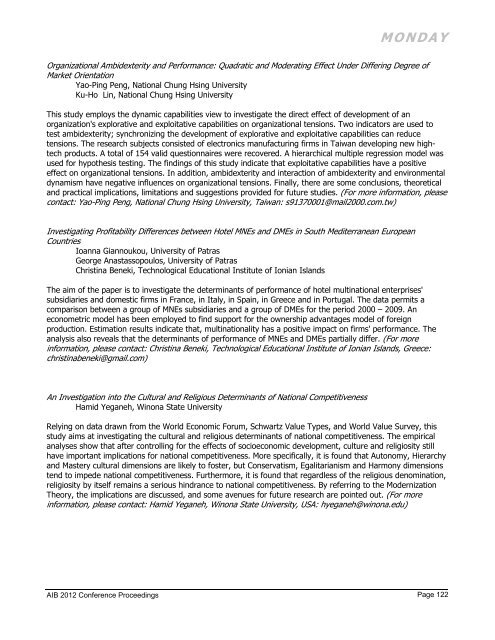AIB 2012 Conference Proceedings - Academy of International ...
AIB 2012 Conference Proceedings - Academy of International ...
AIB 2012 Conference Proceedings - Academy of International ...
Create successful ePaper yourself
Turn your PDF publications into a flip-book with our unique Google optimized e-Paper software.
MONDAY<br />
Organizational Ambidexterity and Performance: Quadratic and Moderating Effect Under Differing Degree <strong>of</strong><br />
Market Orientation<br />
Yao-Ping Peng, National Chung Hsing University<br />
Ku-Ho Lin, National Chung Hsing University<br />
This study employs the dynamic capabilities view to investigate the direct effect <strong>of</strong> development <strong>of</strong> an<br />
organization's explorative and exploitative capabilities on organizational tensions. Two indicators are used to<br />
test ambidexterity; synchronizing the development <strong>of</strong> explorative and exploitative capabilities can reduce<br />
tensions. The research subjects consisted <strong>of</strong> electronics manufacturing firms in Taiwan developing new hightech<br />
products. A total <strong>of</strong> 154 valid questionnaires were recovered. A hierarchical multiple regression model was<br />
used for hypothesis testing. The findings <strong>of</strong> this study indicate that exploitative capabilities have a positive<br />
effect on organizational tensions. In addition, ambidexterity and interaction <strong>of</strong> ambidexterity and environmental<br />
dynamism have negative influences on organizational tensions. Finally, there are some conclusions, theoretical<br />
and practical implications, limitations and suggestions provided for future studies. (For more information, please<br />
contact: Yao-Ping Peng, National Chung Hsing University, Taiwan: s91370001@mail2000.com.tw)<br />
Investigating Pr<strong>of</strong>itability Differences between Hotel MNEs and DMEs in South Mediterranean European<br />
Countries<br />
Ioanna Giannoukou, University <strong>of</strong> Patras<br />
George Anastassopoulos, University <strong>of</strong> Patras<br />
Christina Beneki, Technological Educational Institute <strong>of</strong> Ionian Islands<br />
The aim <strong>of</strong> the paper is to investigate the determinants <strong>of</strong> performance <strong>of</strong> hotel multinational enterprises'<br />
subsidiaries and domestic firms in France, in Italy, in Spain, in Greece and in Portugal. The data permits a<br />
comparison between a group <strong>of</strong> MNEs subsidiaries and a group <strong>of</strong> DMEs for the period 2000 – 2009. An<br />
econometric model has been employed to find support for the ownership advantages model <strong>of</strong> foreign<br />
production. Estimation results indicate that, multinationality has a positive impact on firms' performance. The<br />
analysis also reveals that the determinants <strong>of</strong> performance <strong>of</strong> MNEs and DMEs partially differ. (For more<br />
information, please contact: Christina Beneki, Technological Educational Institute <strong>of</strong> Ionian Islands, Greece:<br />
christinabeneki@gmail.com)<br />
An Investigation into the Cultural and Religious Determinants <strong>of</strong> National Competitiveness<br />
Hamid Yeganeh, Winona State University<br />
Relying on data drawn from the World Economic Forum, Schwartz Value Types, and World Value Survey, this<br />
study aims at investigating the cultural and religious determinants <strong>of</strong> national competitiveness. The empirical<br />
analyses show that after controlling for the effects <strong>of</strong> socioeconomic development, culture and religiosity still<br />
have important implications for national competitiveness. More specifically, it is found that Autonomy, Hierarchy<br />
and Mastery cultural dimensions are likely to foster, but Conservatism, Egalitarianism and Harmony dimensions<br />
tend to impede national competitiveness. Furthermore, it is found that regardless <strong>of</strong> the religious denomination,<br />
religiosity by itself remains a serious hindrance to national competitiveness. By referring to the Modernization<br />
Theory, the implications are discussed, and some avenues for future research are pointed out. (For more<br />
information, please contact: Hamid Yeganeh, Winona State University, USA: hyeganeh@winona.edu)<br />
<strong>AIB</strong> <strong>2012</strong> <strong>Conference</strong> <strong>Proceedings</strong><br />
Page 122

















